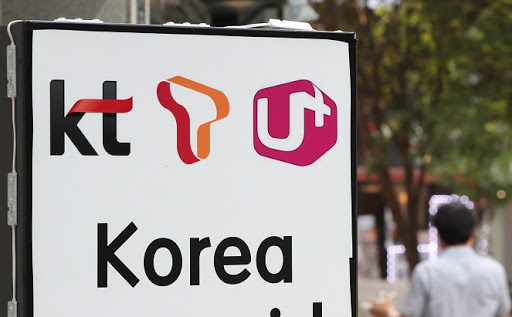Ministry, carriers in gridlock over bandwidth redistribution price
By YonhapPublished : Nov. 19, 2020 - 10:56

As past generation network frequency bands used by South Korea's major telecom operators are set to expire next year, the ICT ministry and the three carriers are locked in a fierce debate over their redistribution price.
Earlier this week, the government said it wants at least 3.2 trillion won ($2.9 billion) from the carriers -- SK Telecom Co., KT Corp. and LG Uplus Corp. -- for the 2G, 3G, 4G frequency bands up for redistribution next year, nearly double their proposal of around 1.65 trillion won.
The price offer is also conditional upon the carriers each having over 150,000 5G base stations by the end of 2022. It had initially estimated a 4.4 trillion won price tag for the reallocation.
"Following the launch of 5G, 4G LTE sales have decreased, leading to less demand for 4G LTE bands," the Ministry of Science and ICT said. "There's a need for optional pricing based on the level of installation of the 5G network."
Depending on the number of base stations installed by 2022, the redistribution price could reach up to 3.9 trillion won.
The announcement stirred backlash from carriers that view the government's offer as overpriced and unrealistic, considering the current number of 5G base stations.
As of August, the three carriers had each installed around 40,000 to 50,000 5G base stations over the past two years, according to government data.
At a similar installation rate, carriers will likely have about 100,000 base stations by 2022.
Given the wide gap between the carriers and the government for the redistribution cost, the telecom operators are reportedly considering taking legal action against the government's move.
The government said it will finalize the price by the end of this month to start taking applications for redistribution next month.
Analysts still expect heavy spending by the carriers next year, given the government's offer.
"Even by conservative estimates, total capital expenditure by the three mobile carriers will likely reach over 8 trillion won next year," Hana Financial Investment analyst Kim Hong-sik said in a report.
Despite the growing number of 5G users in the country, 4G LTE users consisted of 77 percent of South Korea's total 70 million mobile subscriptions as of September. (Yonhap)
Earlier this week, the government said it wants at least 3.2 trillion won ($2.9 billion) from the carriers -- SK Telecom Co., KT Corp. and LG Uplus Corp. -- for the 2G, 3G, 4G frequency bands up for redistribution next year, nearly double their proposal of around 1.65 trillion won.
The price offer is also conditional upon the carriers each having over 150,000 5G base stations by the end of 2022. It had initially estimated a 4.4 trillion won price tag for the reallocation.
"Following the launch of 5G, 4G LTE sales have decreased, leading to less demand for 4G LTE bands," the Ministry of Science and ICT said. "There's a need for optional pricing based on the level of installation of the 5G network."
Depending on the number of base stations installed by 2022, the redistribution price could reach up to 3.9 trillion won.
The announcement stirred backlash from carriers that view the government's offer as overpriced and unrealistic, considering the current number of 5G base stations.
As of August, the three carriers had each installed around 40,000 to 50,000 5G base stations over the past two years, according to government data.
At a similar installation rate, carriers will likely have about 100,000 base stations by 2022.
Given the wide gap between the carriers and the government for the redistribution cost, the telecom operators are reportedly considering taking legal action against the government's move.
The government said it will finalize the price by the end of this month to start taking applications for redistribution next month.
Analysts still expect heavy spending by the carriers next year, given the government's offer.
"Even by conservative estimates, total capital expenditure by the three mobile carriers will likely reach over 8 trillion won next year," Hana Financial Investment analyst Kim Hong-sik said in a report.
Despite the growing number of 5G users in the country, 4G LTE users consisted of 77 percent of South Korea's total 70 million mobile subscriptions as of September. (Yonhap)












![[Today’s K-pop] BTS pop-up event to come to Seoul](http://res.heraldm.com/phpwas/restmb_idxmake.php?idx=644&simg=/content/image/2024/04/17/20240417050734_0.jpg&u=)





![[KH Explains] Hyundai's full hybrid edge to pay off amid slow transition to pure EVs](http://res.heraldm.com/phpwas/restmb_idxmake.php?idx=652&simg=/content/image/2024/04/18/20240418050645_0.jpg&u=20240418181020)

![[Today’s K-pop] Zico drops snippet of collaboration with Jennie](http://res.heraldm.com/phpwas/restmb_idxmake.php?idx=642&simg=/content/image/2024/04/18/20240418050702_0.jpg&u=)